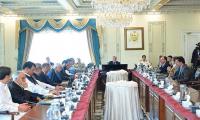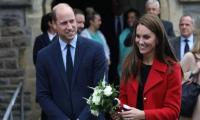How PML-N and its allies lost to the opposition in the elections for Senate chairman and deputy chairman slots despite having majority in the upper house of the parliament could be an eye-opener for Sharifs, as it could be a possible blue-print for the July 2018 general elections, particularly in case of a hung parliament.
The Senate result was certainly a major setback for the PML-N and former prime minister Nawaz Sharif, as they were certainly planning few amendments on the basis of majority in the two houses of the parliament before general elections.
The PML badly misread the situation, which was building up for the last two months, and did little to prevent it particularly what happened in Balochistan followed by Karachi and even in Punjab during Senate elections.
The PML-N loss may not necessarily be PPP’s or PTI's gain, but certainly a hint about the future political scenario in case of a hung parliament, after 2018 elections as the two parties may not join hands before the polls for any electoral alliance.
Imran Khan had to compromise on his strategy. For the former president Asif Ali Zardari, “politics is the game of possible, and not of principles”, and he is successful in it, so far.
It is also sad to see the way the name of Balochistan was used. True, that for the first time someone from the province was elected as chairman Senate, but he has no party of his own and he’s only a member of an Independent group. A much better and respected way could have been adopted.
It will be a big challenge for Senate Chairman Sadiq Sanjrani to prove his critic wrong as his performance would be closely monitored. Same will be the problem for Chief Minister Balochistan Abdul Qaddus Bizenjo. The group has to pick between the PPP and the PTI to establish their credibility before general elections.
When the PML-N high command, which met in Islamabad on Tuesday, carried out a post-mortem of the situation, it must have assessed it loss in Senate. One still has to wait and see whether the party will review its strategy or not, while addressing the possible outcome of the elections as they may face more alarming situation before July polls.
The PML-N had not lost top Senate slot on March 12, as it all started with a mini coup occurring in Balochistan and they could not prevent it. Within no time, the PML-N simply vanished and the so-called revolt was not against former chief minister Sanaullah Zehri, who was ousted, but there was something more which we saw in the Senate on Monday.
It was followed by Sindh. What happened in Senate elections in the province and particularly with the MQM-P looked part of the same game plan, and what is about to come in 2018 elections. Here too, the MQM-P fate not looked very different from what happened to the PML in Balochistan.
The party, which had 50 MPAs in 2013 elections, could only get one senator in 2018, after four of its senators retired. The PML-N leadership badly misread Karachi. It allowed engineering of the MQM, without realising that in the end this could also prove costly for them.
After seven of its MPAs, joined Pak-Sarzameen Party (PSP), the MQM-P tally of MPAs reduced to 38, but it did not stop there and they got further divided between the MQM-PIB and MQM-Bahadurabad.
Even in the worst scenario, the opposition in Sindh had 63 MPAs and could have easily got four seats, but the formula of divide and rule prevailed, bringing only two seats for the opposition: PML-F, Syed Muzzafar Hussain Shah, and MQM, Farogh Naseem. PPP become the main beneficiary with 10 senators.
An interesting development took place in Punjab, where despite chances of the PML-N clean sweep, PTI's Chaudhry Sarwar won. It was not possible without defection in the PML-N in Punjab and this trend was followed on Monday, as well during Senate chairman's election. Who are those MPAs and MNAs within the PML-N, need to be found out.
Those who have been playing this game for long also knew that it was still not good enough and the PML-N became the single largest party in the Senate with 34 seats against PPP’s 20 and PTI’s 13.
Even just before the polling for Senate chairman, the ruling alliance had 52 senators against opposition’s 50, but when the ballot box was opened in the evening, the ruling alliance lost to opposition by a sizeable margin. One of the biggest critics of democracy and the PML-N called it a ‘beauty of democracy’. “I am sure that had this result been gone in favour of the PML-N, it would have been called sham democracy.”
In democracy, you don't open your cards or even expose your popularity particularly when you have problems with institutions. Former president Asif Ali Zardari had learnt this art of possible, when, for the first time, the late Benazir Bhutto's government faced vote of no-confidence in 1989.
It was for the first she realised that the then establishment had not accepted her as an elected prime minister. Firstly, it blocked PPP's chances of taking two-thirds majority and formed the Islami Jamhoori Ittehad (IJI), led by Nawaz Sharif, and then a vote of no-confidence was carried out in which massive money was used.
This writer was once told by Benazir Bhutto in 2007 why she made up her mind to get rid of Article 58-2(B) and secure presidency as well. After her assassination, Zardari ensured that he should go to the presidency and took a bold decision of handing over presidential powers to the parliament.
He also knew that very strong and independent judiciary could also be a problem; therefore, despite his agreement with Nawaz Sharif over restoration of deposed judges, he delayed the matter for almost one year.
In 2015, Zardari warned Nawaz Sharif, during a meeting in Karachi, that if he did not checked certain actions against Sindh government and the PPP, particularly from NAB, the PML-N and he could be the next target. When Sharif did not act or prevent such actions and Zardari was targeted through instances like Dr Asim Hussain, Anwar Majeed and detention of his three managers or aides, he severed all his ties with Sharif.
So, he and the PPP dumped its most respected senator and former chairman, Raza Rabbani, to get some positive results in future as well.
It is time for Nawaz Sharif to understand that his narrative, irrespective of the fact how popular it is, may not be allowed to succeed, something which party leaders like Shahbaz Sharif and Chaudhry Nisar have been trying to pursue.
Mr Sharif needs to understand that mere popularity and majority could not save and secure him. No political leader in this country was as popular as the late Zulfikar Ali Bhutto. He became more popular after he was ousted in July 1977, but two things which resulted in the postponement of elections in Oct 1977 and his ultimate fate, was: first, he exposed his popularity too early and second his public criticism of the then generals.
Even majority in elections did not ensure smooth sailing. At least, this is what I have learnt from political history of Pakistan.
The writer is a senior columnist and analyst of GEO, The News and Jang
Twitter: @MazharAbbasGEO
Kasuri urged authorities of Pakistan and China to pull their resources to defeat forces seeking to disrupt the...
IHC said that several people had not returned the cipher copies they had, and asked if it meant it was right for the...
Gilani gave floor to Leader of Opposition Syed Shibli Faraz, who insisted that with unity they could take country...
Match witnessed intense action and dramatic twists, keeping fans on the edge of their seats until the final ball
Apex court bench was reconstituted after Justice Yahya Afridi recused himself from hearing the case earlier this month
ECP issued a notification in this connection pursuant to orders passed by LHC







